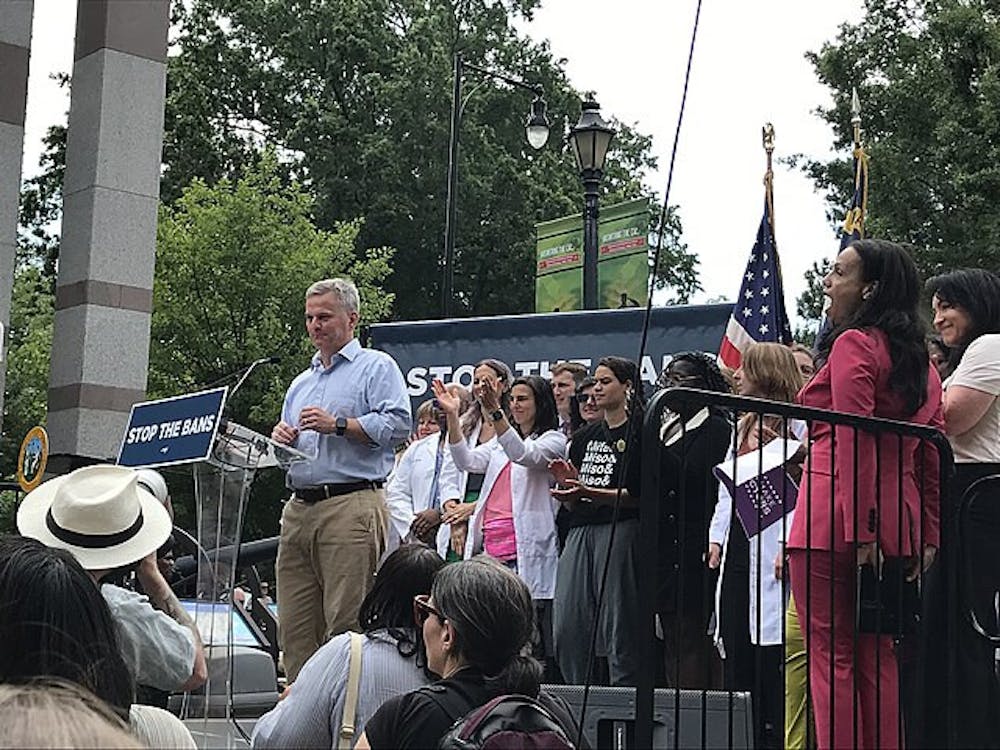North Carolina Attorney General Josh Stein held a virtual press event Friday with student reporters, his first student media event since winning the Democratic nomination for governor in early March.
During the session, Stein laid out his vision for North Carolina and focused on priority issues, including the rising cost of living and public education.
“[I’m] fighting for you — all North Carolinians — for your fundamental freedoms, whether those are reproductive rights or voting rights,” Stein said. “To be able to do this work has been a great honor for me.”
Stein is currently serving his eighth year as attorney general, after being elected first in 2016 and reelected in 2020. He previously served as a state senator from 2009 to 2016 representing the 16th district in Wake County.
Stein faces Lt. Gov. Mark Robinson, a Republican in the November election. He noted voters face a “stark choice” in November between himself and Robinson, given the lieutenant governor’s recent controversial and inflammatory statements on the topics of race, abortion, education and religion.
In his initial remarks, Stein reflected on his tenure as attorney general, which he characterized as focused on “making our community safer.” He highlighted his work to secure settlements for families of victims of the opioid crisis, accelerate the testing of rape kits to aid in sexual assault arrests and hold industries accountable for contaminating drinking water with chemical pollutants.
“I want to take that same fighting spirit to the governor's office where I can keep fighting to make sure that this economy works for everybody … where kids can go to good public schools from early childhood pre-K through community college and university, and where folks can live in safe communities,” Stein said. “I think that is a future we can achieve here in North Carolina.”
Stein also emphasized the need to grow the economy and address what he perceives as threats to fundamental liberties, such as reproductive and voting rights.
Following his opening statement, Stein answered reporters’ inquiries on state issues regarding public education, the youth mental health crisis, housing and the cost of living, protecting LGBTQ+ North Carolinians and gun violence.
Stein noted his political views are largely similar to incumbent Democratic governor Roy Cooper’s, whom he has known for the past 25 years. Gov. Cooper — who is currently serving his second consecutive term — is ineligible for reelection.
Stein explained that rapid economic growth, including in the Triangle area, has driven up the cost of living for many North Carolinians.
“We’re in many ways a victim of our own success,” he said.
Stein emphasized the need to increase housing supply to address the issue. He hopes to incentivize local governments through the North Carolina Housing Finance Agency to permit more residential construction and to crack down on illegally inflated home pricing using state antitrust laws, something he has begun in his current role as attorney general.
To combat what he referred to as the “scourge of gun violence,” Stein highlighted elements of his education platform, including hiring more school social workers and mental health professionals.
“Kids shouldn’t have to worry when they’re in school, [and] parents shouldn't have to worry about their children when they go to school,” Stein said.
Stein stated that implementing a Red Flag Law, which would allow an individual’s close relatives to petition courts to seize their firearms if there is a threat to public safety, and enacting comprehensive statewide background checks would also prevent guns from getting into the wrong hands.
However, he likened gun safety measures to seatbelt laws and other traffic regulations geared toward driver safety in the sense that they may not entirely eliminate the problem but can significantly mitigate its consequences.
“There is no silver bullet. We cannot eliminate gun violence in this country. I'm not naive,” Stein said.
Stein responded to a question about how he plans to combat the rise of distrust in public institutions — especially prevalent among students — and reverse this trend in the face of partisanship should he win in the upcoming election.
Stein blamed “egregious” partisan gerrymandering for partly causing and exacerbating the problem.
Get The Chronicle straight to your inbox
Sign up for our weekly newsletter. Cancel at any time.
“What gerrymandering does is it drives people to their extreme because you're not worried about losing a general election in a competitive election,” Stein said. “You're worried about losing a primary [to] somebody who, if you're a Democrat, is to the left of you, or if you're Republican, who is to the right of you — so it pushes representatives to the extreme.”
This issue is of particular importance since the U.S. Supreme Court’s landmark 2019 ruling in Rucho v. Common Cause, which stated that partisan gerrymandering cases could not be decided in federal courts.
North Carolina’s Supreme Court overturned a decision striking down a partisan gerrymander in favor of Republican legislators, who passed new maps that will likely secure three more Congressional seats for the party following November's election.
“Legislators have grabbed more and more power over important institutions in the state to everyone’s detriment. In addition to making the laws, they are trying to control both the executive and judicial branches as well,” Stein wrote in an email to The Chronicle following the event.
“They have made the courts partisan, have given themselves the power to appoint judges and to influence investigations of judges, and seek control over the administration of our elections,” he wrote.
To restore trust in government, Stein pledged to “expand NC [State Bureau of Investigation]’s authority to investigate public corruption, “[extend] cooling off periods for outgoing elected officials to become lobbyists” and “fight for an independent redistricting commission to draw fair and competitive legislative districts and for independent courts by making our courts nonpartisan.”
Samanyu Gangappa is a Trinity sophomore and local/national news editor for the news department.

